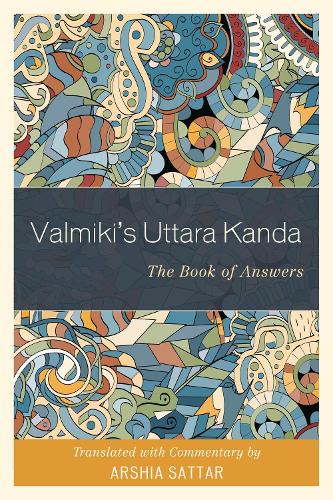
Valmiki's Uttara Kanda: The Book of Answers
(Hardback)
Available Formats
Publishing Details
Valmiki's Uttara Kanda: The Book of Answers
By (Author) Arshia Sattar
Bloomsbury Publishing PLC
Rowman & Littlefield Publishers
31st August 2017
United States
Classifications
Tertiary Education
Non Fiction
294.5922
Physical Properties
Hardback
316
Width 156mm, Height 238mm, Spine 23mm
553g
Description
The last and most intriguing book of the Ramayana, the Uttara Kanda is rendered here by noted Sanskrit scholar Arshia Sattar in vivid, sensuous detail.First composed around 500 BCE, it tells the story of an unjustly exiled prince, the abduction of his wife from the forest by a ten-headed demon king, his alliance with a band of magical monkeys, and the internal and external battles he must fight to win back his wife and keep her. Indias great Sanskrit epic brings to readers the classic dilemmas every individual faces: love versus duty, destiny and free will, the public and the private self, the pull of family, and the right to personal happiness. These universal problems are layered with the quintessentially Indian ideas of karma (action) and dharma (duty).The book explores what it means to be human in a complex and demanding world, considering the parameters and contexts in which we make the decisions that will determine the color and tenor of our lives, the choices that make us who we are. It also offers a great, albeit tragic, love storya story of the demands and pressures of love and how we might fail those that we love most. Accompanied by Sattars thoughtful essays weighing the moral complexity of this most enduring of epics, this translation crystallizes her deep and intimate knowledge of the Ramayana in a way that is utterly compelling.
Reviews
Both a terrific read and a revolutionary contribution to our understanding of the Valmiki Ramayanaand of the many Ramayanas that followed. The translation is smooth, spirited, and accurate, and the seven essays brilliantly illuminate the text. Together they show why this largely unknown final book of the Ramayana is the answer to many of the enigmas in the rest of the text and the explanation of much of the worship of Rama that is to come. -- Wendy Doniger, University of Chicago
No one has written with greater empathy about the Ramayana and about Rama than Arshia Sattar. In her translation and study of the epic's final book, she gets to the heart of the Ramayana dynamics as they come to their elegiac, contradictory, and transcendent conclusion. Her exploration of the sociopolitical, literary, and religious signifiers in the conclusion of India's preeminent romantic legend is both accessible and illuminating. Just as the Uttara is a discursive epilogue to the Ramayanaitself, so Sattar's essays are a satisfying and stimulating coda to her vigorous translation of the text. -- David Gitomer, DePaul University
Arshia Sattars lively and accessible new translation brings life to the often-overlooked but crucial final volume of Valmikis epic. This illuminating kanda portrays the history of Ravana, Hanumans mischievous childhood exploits, and two of the most controversial episodes in the entire epic. Sattars introductory essays provide readers with a cogent framework to appreciate and analyze the subtleties of the story. -- Paula Richman, Oberlin College
Author Bio
Arshia Sattar holds a PhD in South Asian Languages and Civilizations from the University of Chicago. She teaches classical Indian literature at several institutions in India and writes for a number of journals and magazines. Her books include Lost Loves: Exploring Ramas Anguish and English translations of Valmikis Ramayana and the Kathasaritsagara.
